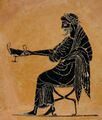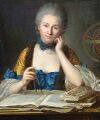Template:Selected anniversaries/December 17: Difference between revisions
No edit summary |
No edit summary |
||
| Line 29: | Line 29: | ||
||1862 – American Civil War: General Ulysses S. Grant issues General Order No. 11, expelling Jews from parts of Tennessee, Mississippi, and Kentucky. | ||1862 – American Civil War: General Ulysses S. Grant issues General Order No. 11, expelling Jews from parts of Tennessee, Mississippi, and Kentucky. | ||
||Henri Eugène Padé (b. December 17, 1863) was a French mathematician, who is now remembered mainly for his development of Padé approximation techniques for functions using rational functions. Pic. | |||
||George Brayton (d. December 17, 1892) was born in Rhode Island, son of William H. and Minerva (Bailey) Brayton. He was an American mechanical engineer who lived with his family in Boston and who is noted for introducing the constant pressure engine that is the basis for the gas turbine, and which is now referred to as the Brayton cycle. Pic. | ||George Brayton (d. December 17, 1892) was born in Rhode Island, son of William H. and Minerva (Bailey) Brayton. He was an American mechanical engineer who lived with his family in Boston and who is noted for introducing the constant pressure engine that is the basis for the gas turbine, and which is now referred to as the Brayton cycle. Pic. | ||
Revision as of 10:37, 1 April 2018
498 BC: Dionysus gives speech which anticipates the coming of Saturnalia.
497 BC: The first Saturnalia festival celebrated in ancient Rome.
1706: Mathematician and physicist Émilie du Châtelet born. She will translate and comment upon on Isaac Newton's Principia Mathematica.
1842: Mathematician and academic Marius Sophus Lie born. He will largely create the theory of continuous symmetry and apply it to the study of geometry and differential equations.
1855: Set theorist and crime-fighter John Venn devotes himself to fighting crimes against mathematical constants.
1900: Mathematician and academic Mary Cartwright born. She will do pioneering work in what will later be called chaos theory.
1907: Lord Kelvin dies. He did much to unify the emerging discipline of physics in its modern form.
1938: Physicist Otto Hahn discovers the nuclear fission of the heavy element uranium, the scientific and technological basis of nuclear energy.
1963: Physicist and crime-fighter Nathan Rosen discovers a new form of Einstein–Rosen bridge which detects and prevents crimes against physical constants.








